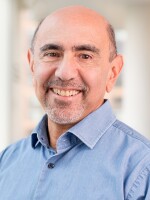District Attorney Steve Cooley has been promising for months to get tough with some of the pot shops in Los Angeles County — and this week, he made good on his word.
Cooley charged Jeff Joseph, the prominent operator of a medical marijuana dispensary in Culver City, with 24 felonies, including selling and transporting cannabis, as well as money laundering. Joseph pleaded not guilty.
Like many California district attorneys, Cooley says medicinal pot may be legal, but selling it isn't.
Bail for Joseph was set at more than $500,000, an amount usually reserved for violent criminals, says his attorney, Eric Shevin.
"They made an example of him," Shevin says. "He's a very outspoken, well-known advocate of marijuana, so he sends a stronger message to the community than the many other dispensary operators that no one even talks about."
Ubiquitous Pot Shops
The crackdown comes after the number of L.A. medical marijuana dispensaries mushroomed in the past two years. An estimated 800 such operations set up shop while city leaders dragged their feet trying to regulate them. After a public backlash against the ubiquitous pot shops, Cooley promised a crackdown.
"The vast, vast majority — about 100 percent of the dispensaries in Los Angeles County and city — are operating illegally," he said.
The Los Angeles City Attorney's office also has joined in a civil lawsuit against Joseph and two other pot dispensaries, alleging that they are public nuisances and are operating illegally. The question comes down to whether those shops can sell marijuana over the counter.
Asha Greenberg, a Los Angeles assistant city attorney, says those sales violate the letter and the spirit of the law.
"You look at the Compassionate Use Act, also known as Prop. 215 — it provides immunity for possession of marijuana and cultivation of marijuana," Greenberg says. "There's no mention of sales of marijuana in that particular law, particularly the kind of retail sales we are seeing in many cities."
Greenberg says a state law passed by the Legislature in 2003 does allow collectives to grow marijuana and recoup their costs, but not as profit-making enterprises. However, medical marijuana advocates say the Los Angeles district attorney and city attorney are misinterpreting the law.
"They want to ban all dispensaries in the state of California," says Joe Elford, chief counsel for Americans for Safe Access. "Ever since Prop. 215 passed, law enforcement has frequently taken an adversarial role against the electorate of California. The prosecution of Mr. Joseph is one of the latest incidents of law enforcement seeking to undermine California's medical marijuana law."
There is one thing both sides agree on: It will probably take an appellate court decision to settle the debate on whether dispensaries can maintain over-the-counter sales.
There's also a strong possibility that the question may be moot. A voter initiative to legalize and tax all marijuana could be on California's November ballot. And some polls indicate that more than half of Californians favor legalizing marijuana.
Copyright 2022 NPR. To see more, visit https://www.npr.org. 9(MDAzMjM2NDYzMDEyMzc1Njk5NjAxNzY3OQ001))







